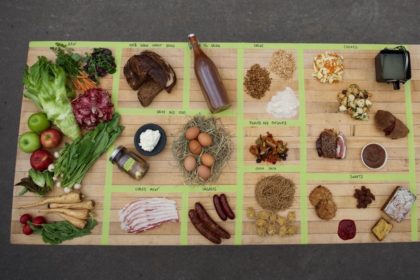
In an effort to help struggling farms during the coronavirus pandemic, Blue Hill at Stone Barns is expanding their fermentation program.
The upscale restaurants (Blue Hill in Manhattan and Blue Hill at Stone Barns in Westchester County) have long been at the forefront of farm-to-table dining. But, like all restaurants in New York, Blue Hill closed in March when the coronavirus pandemic broke out. Though co-owners Dan and David Barber are confident the traditional restaurant model will once again return, the brothers are troubled by the catastrophic impact on farms.
Blue Hill Farm and Stone Barns Center (a non-profit farm and educational center) have partnered to form a new entity resourcED, which surveyed over 500 farmers. A key conclusion — over a third of farms will not survive the pandemic. August sales at farms are expected to be down by 50% due to the COVID-19 pandemic, and over 30% of farmers say they are struggling to cover expenses.
“The excess product is a huge concern. That’s shaped our box program, our fermentation program,” says Andrew Luzmore, Blue Hill’s market forager.
The resourcED survey was the impetus at Blue Hill to launch their picnic dining and box program. Diners can buy a picnic dinner and eat a farm-to-table meal on the farm’s patio or lawn (physically distanced from others), still allowing Blue Hill to purchase food from local farmers. This program allows consumers to pick-up a box full of produce, dairy products, seafood or meat, all sourced from local farms.
Blue Hill’s mainstay fermentation and preservation programs, used for over 15 years to maintain food flavor and nutrients through long Northeastern winters, have also been expanded, to absorb more of excess farm production.
“The focus on preservation program is bred out of necessity, and necessity breeds creativity,” says Cortney Burns, chef, fermentation consultant for Blue Hill and author of “Bar Tartine, Techniques & Recipes” and the forthcoming “Nourish Me Home.” “What we’re doing now with fermentation at Blue Hill rides on the coattails of what has been part of the backbone of Blue Hill for years. Working here has me looking at fermentation through a different lens these days. How can we be completely in service to good agriculture? How can we create a greater economy for farms?”
Adds Luzmore: “The fermentation program has definitely expanded a lot. We’re shifting more to helping farmers with excess product.”
For example, Blue Hill recently purchased napa cabbage that would have been wasted from a Hudson Valley farmer. They are fermenting the cabbage, “making a delicious, nutritious probiotic-rich food for our diners, whilst buying up overabundant harvests,” Burns notes.
It’s conscious cooking, Burns says “We’re not just buying for the sake of preservation. We want to create variety.” Another example is how the Stone Barns Center is trialing preserving different beet varieties.
Fermented grapes and capers, buckwheat vinaigrette, peach umeboshi and whey tonic are among the creations Blue Hill has served picnic-style and in boxes. Some of the fermented food being offered is purchased from local farmers. Local cultured dairy — such as farm fresh cheese and yogurt — makes up a large percentage of their dairy box, for example.
“There are all these different ways we’re harnessing the power of fermentation,” Burns says. “We’ve had to shift our expectation of a restaurant kitchen. We need to make sure that first, the food doesn’t spoil, and second, that we have lots of probiotic rich food loaded with flavor to serve people.”
A picnic meal at Blue Hill is $195 per person and the boxes range from $45 to $170. Blue Hill is also donating boxes to families with food insecurities.
Luzmore hopes other restaurants will innovate ways they can support local farms during the pandemic. “It’s almost impossible to buy exactly the amount a restaurant needs, especially now when there’s a greater need to support farms. Considering the constant and changing flux of product coming into the restaurant for the boxes and donations, fermentation allows for a more holistic approach of using excess product.”
“Chef Dan [Barber] has said many times throughout the launch of resourcED: we’ve kind of gone from being a restaurant to a food processing facility. Blue Hill is a fine dining restaurant. We still maintain that mentality and quality, but it’s at a different level. The scale, we’re now thinking of purchasing pallets instead of pounds.”
